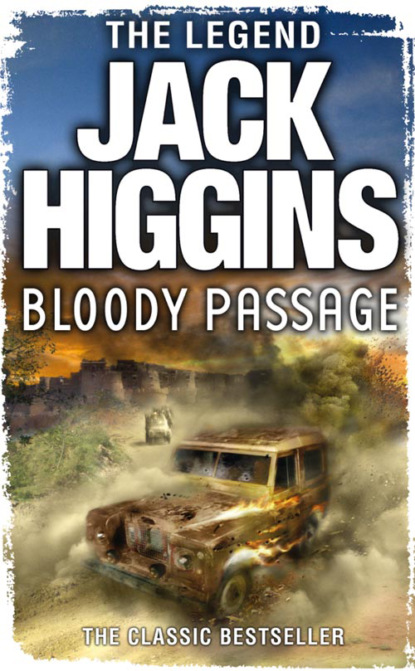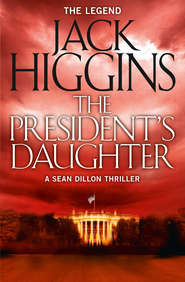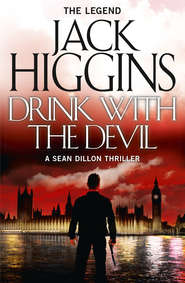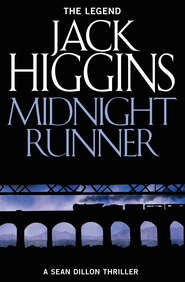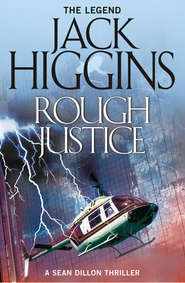По всем вопросам обращайтесь на: info@litportal.ru
(©) 2003-2024.
✖
Bloody Passage
Автор
Год написания книги
2019
Настройки чтения
Размер шрифта
Высота строк
Поля
Our friend fired again, shooting off the right hand leg of the easel so that it toppled over the dike into the water.
‘Damn his eyes,’ I said. ‘I liked that painting. It was coming along fine. The way you were soaking the blues into the background wash was particularly pleasing.’
She turned, her face contorted with fear, looking as if she might break into pieces at any moment. ‘Please, Oliver, do something! I can’t take any more of this!’
The wine bottle exploded like a small bomb, showering glass everywhere, staining the white cloth scarlet.
‘Now that really does annoy me,’ I said. ‘Lafite 1961. A really exceptional claret. I was going to surprise you. Here, hold this.’
I gave her the shotgun and took off my hunting jacket. ‘What are you going to do?’ she demanded.
I told her and when I’d finished, she seemed a little calmer, but was still obviously very frightened. I kissed her briefly on the cheek. ‘Can you handle it?’
She nodded slowly. ‘I think so.’
I slipped the jacket over the muzzle of the shotgun and eased it up over the top of the reeds. There was an immediate shot and as the jacket was whipped away, I cried out in simulated agony.
I turned to Simone who waited, white-faced, waist-deep in that foul water. ‘Now!’ I whispered.
She screamed out loud, scrambled up on to the dike, got to her feet and started to run toward the Landrover. He fired once, chipping a stone a couple of yards in front of her. It was all it took and she stopped dead, crying out in fear and stood there, waiting for the ax to fall. There was a movement in the reeds to my right and then boots crunched in the gravel of the dike top.
‘What happened?’ a voice called in French.
He moved past me toward her, a young, sallow-faced man with shoulder-length hair and a fringe beard. He wore a reefer jacket and rubber waders and carried the Lee Enfield at waist level.
The oldest trick in the book and he’d fallen for it.
I slipped up out of the reeds and moved in close. I don’t know whether it was the expression on Simone’s face or – more probably – the distinct double click as I cocked the shotgun, but in any event, he froze.
I said in French, ‘Now put it down very carefully like a good boy and clasp your hands behind your neck.’
I knew he was going to shoot by the way his right shoulder started to lift, which was a pity because he didn’t really leave me much choice.
He turned, crouching, to fire from the hip and Simone screamed. Having little choice in the matter I gave him both barrels in the face, lifting him off his feet and back over the edge of the dike into the reeds.
The marsh came alive again, birds rising out of the reeds in alarm, calling to each other, wheeling endlessly. Simone stood there transfixed, her face very white, staring down at the body. Most of him was submerged, only the legs from the knees to the feet encased in the rubber waders floated on the surface.
The next bit wasn’t going to be pleasant, but it had to be done. I said, ‘I’d go back to the Landrover if I were you; this won’t be nice.’
Her voice was the merest whisper and she shook her head stubbornly. ‘I’d rather stay with you.’
‘Suit yourself.’
I handed her the shotgun, got down on my hands and knees, secured a firm grip on each ankle and hauled him up on to the dike. Simone gave an involuntary gasp, and I didn’t blame her when I saw his face, or what was left of it.
I said, more to get her out of the way than anything else, ‘Bring me the rug, there’s a good girl.’
She stumbled away and I opened the jacket and searched him, whistling softly between my teeth. It didn’t take long, mainly because there was nothing to find. I squatted back on my heels and lit a cigarette and Simone returned. She still clutched the shotgun in one hand, the rug in the other which she handed me mutely.
As I wrapped it around his head and shoulders, I said, ‘Curiouser and curiouser, just like Alice. Empty pockets, no identity marks in the clothing.’ I lifted his hand, ‘Indentation in the left finger where a signet ring has habitually been worn, but no ring.’
A professional all right. Stripped for action so that there would be no possibility of tracing him or his masters if anything went wrong. But I didn’t say so to Simone because when I looked up, the dark eyes burned in the white face and her hands were shaking. She tightened her grip on the shotgun as if making an effort to hold herself together.
‘Who was he, Oliver?’
‘Now there you have me, angel.’
‘What did he want?’ The anger in her was barely contained. It was as if she might blow up at any moment.
‘I’m sorry,’ I said gently. ‘I can’t help you. I’m as much in the dark as you.’
‘I don’t believe you.’ The anger overflowed now, all the tension, the fear of the past ten or fifteen minutes pouring out of her. ‘You weren’t afraid when you were out there, not for a single moment. You knew exactly what you were doing. It was as if that kind of thing was your business and you were too good. Too good with this!’ She brandished the shotgun fiercely.
I said calmly, ‘It’s a point of view, I’ll give you that.’
I knelt down beside the dead man, heaved him over my shoulder and stood up. She said quickly, ‘What are you going to do? Get the police?’
‘The police?’ I laughed out loud. ‘You’ve got to be joking.’
I bent down and picked up his Lee Enfield then walked along the dike toward the Landrover. There was a patch of bog amongst the reeds on my right; black viscous mud. The sort of place that might be five feet deep or bottomless. When I tossed him in he slid beneath the surface instantly. There was a bubble or two, the stink of marsh gas. I threw the Lee Enfield after him and turned.
Simone was standing watching me, still clutching the shotgun, a kind of numbed horror on her face. Thunder rattled like distant drums again, overhead this time, and the rain which had threatened all day came with a rush, hissing into the reeds.
It was somehow symbolic, I suppose, for with a sudden fierce gesture Simone tossed the shotgun over my head, out into the reeds. She started to cry bitterly, shoulders shaking and I put my arms about her.
‘It’s all right,’ I said soothingly. ‘Everything’s fine. I’ll take you home now.’
I turned and led her along the dike toward the Landrover.
I half-filled a tall glass with crushed ice, added a double measure of Irish gin and topped up with tonic water. Then I switched on the radio and turned the dial to Madrid. A little flamenco music would have been appropriate, but all I got was an old Glen Miller recording of Night and Day.
I pushed open one of the glass doors and moved out onto the terrace. Rain dripped from the fringes of the sun awning and I could smell the mimosa, heavy and clinging on the damp air.
The villa was built to a traditional Moorish pattern and stood in splendid isolation, which was the main reason I’d bought it, on a point of rock a hundred feet above a horseshoe cove thirty or forty miles south-east of Almeria toward Cape de Gata.
I’d been here almost a year now and never tired of the view, even on an evening like this with rain falling. There were lights outside the cove, not too far away, where local fishermen were stringing their nets and a liner drifted through the darkness five or six miles out and beyond it, Africa.
It all filled me with a vague, irrational excitement or perhaps it was just the events of the afternoon catching up. Heavy beads of rain rolled down the door and Simone became part of the room’s reflection in the dark glass.
The black hair hung to her shoulders, she wore a plain linen caftan so long that it brushed her bare feet. It was an original, soaked in vegetable dyes in a back room in some Delhi bazaar until it had reached that exact and unique shade of scarlet so that it seemed to catch fire there in the half-shadows of the room.
I turned and toasted her. ‘You can cook, too. The meal was enormous.’
She said gravely, ‘I’ll get you another drink,’ and went behind the bar in the corner.
‘That sounds like a good idea.’ I sat on one of the high cane stools and pushed my glass across.
She took down the gin bottle. ‘I didn’t even know there was such a thing as Irish gin until I met you.’





